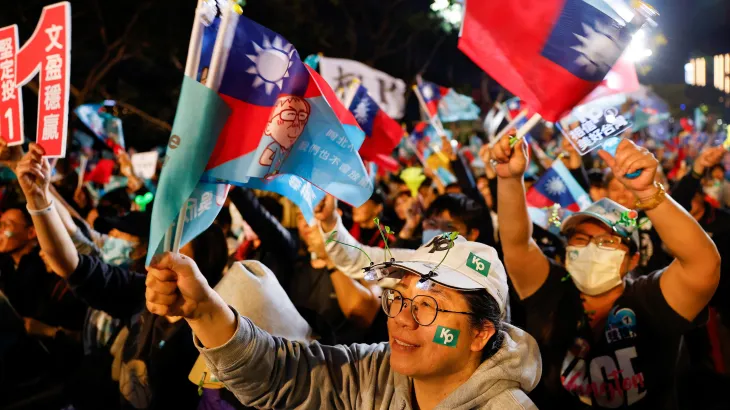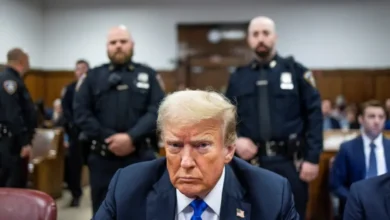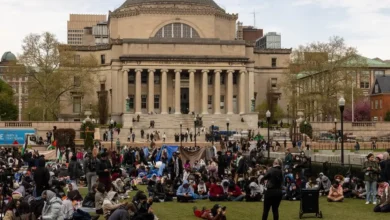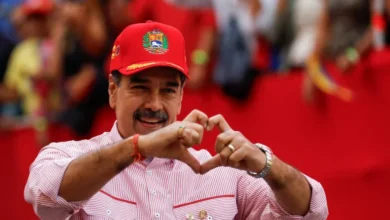Taiwan’s Gen Z voters want something new in Saturday’s election

On ‘Super Sunday’ as Taiwan’s three leading political parties converged on the southern city of Kaohsiung, 28-year-old Vivian and her nervous dog Kimmy stood together on the fringes of a rally for presidential candidate Ko Wen-je.
Ko was once a mayor of Taipei, but he and his small Taiwan People’s Party (TPP) has never held national office.
That is no concern for his supporters.
“I think that although Ko is a brand-new choice, judging from his policies and the debate, you can understand his logic,” Vivian told Al Jazeera, standing in a spill-over section at the crowded rally on January 7. “It makes it easy for me to understand what he wants to do.”
Four years ago in the 2020 presidential election, Vivian, who did not want to share her full name, says she voted for the incumbent Democratic Progressive Party (DPP). So did many other young people, who turned out in their droves and helped President Tsai Ing-wen win a second term in a landslide.
But this time it is different. Vivian wants a change from the usual two-party competition between the DPP and Kuomintang (KMT), and that could be a worrying sign for this year’s DPP presidential candidate William Lai Ching-te.
Its appeal to young people – voters must be 20 or over in Taiwan – is the latest challenge for a political party that previously had to contend with problems like martial law, the once powerful KMT, which headed Taiwan from the 1940s until the year 2000, and several years in the political wilderness following the 2008 arrest of its first president, Chen Shui-bian on corruption charges.
The DPP’s fortunes were revived by 2014’s Sunflower Movement, a pivotal student protest against a controversial trade deal that would have given Beijing more leverage over Taiwan. When the DPP absorbed many Sunflower activists and policy platforms, the party earned itself lasting popularity with many Millennials and eight years in the presidential palace.
The party also learned a thing or two about marketing from its young supporters, rebranding technocrat Tsai into an “iron cat lady”, standing up to China, which claims Taiwan as its own territory, while flanked by her various photogenic pets.
Now a decade later, Taiwan’s next generation of Gen Z and younger Millennial voters born in the late 1990s and early 2000s are emerging as a political force, and they see the DPP not as the party of outsiders who can bring change, but as part of the establishment.
The next generation steps up
Some DPP members even have a name for this group of young voters: the mingzhu fuerdai or “second generation democracy”. The term is a play on fuerdai, a Mandarin Chinese word for people who grew up with inherited wealth – often the children or grandchildren of a hardworking entrepreneur.
In Taiwan, mingzhu fuerdai grew up long after the end of martial law in 1987 or the 1990 White Lily student movement that led to the island’s first democratic elections. These voters, from the minimum age of 20 to 29, make up more than 14 percent of the electorate, according to the Central Election Commission, with 2.8 million eligible voters out of the total of 19.5 million.
They are followed by voters aged 30 to 39, who make up a slightly larger 16.5 percent, born shortly before Taiwan’s first democratic elections in 1996 or earlier, according to government data. Voters over 40 make up nearly 70 percent of the electorate.
“Younger people don’t have experience fighting for democracy. The history of democracy in Taiwan is just in the textbook; they learn from it, but they don’t know how people like our president and actually many [others] fought for this,” 30-year-old DPP legislative candidate Huang Jie told Al Jazeera from her campaign office in Kaohsiung.
Huang wondered whether this slight feeling of apathy might also be a sign of the success of Taiwan’s democracy; that people no longer have to fight for their political and civic freedoms. “Maybe it’s a good thing for the younger generation because they can enjoy freedom and democracy and they don’t need to think about it,” she said.
This year’s campaign is being fought on mostly domestic issues, says Huang, while the regional and global events that shaped the 2020 election, such as Hong Kong’s democracy protests, have retreated into the background. The protests gave Taiwanese voters, however briefly, a glimpse of what a future could look like under Chinese rule, with images of young protesters battling riot police or being arrested afterwards. Many were fearful about what they saw.
Daily life concerns trump others
Many of the concerns of young Taiwanese are similar to the problems faced by young people elsewhere in the world, like the rising cost of living in major cities and a housing market that favours the older generation over first-time buyers.
Others may yearn for something different to Taiwan’s longstanding two-party system.
“Many young people are tired of the old political culture based on the blue and green party culture,” said 31-year-old Huang Ching-in, a prominent member of the TPP and a Taipei City councillor, using common nicknames for the “blue” KMT and “green” DPP.
“With the TPP, they see a different political model,” she said.
Ko’s supporters on Sunday spoke of how they liked his direct communication style and his use of social media, particularly sites like YouTube that let him connect with voters away from the glare of Taiwan’s highly partisan media landscape.
Huang highlighted these differences, as well, and other tools, such as the TPP’s use of live streaming on Facebook and Instagram, which she said made young voters feel closer to the party and able to directly ask its members questions.
Ko is notably the only major candidate trending on TikTok in Taiwan, where on January 11 #柯文科2024 (#Ko Wen-je 2024) was in the top 20 hashtags with 312 posts and four million views. The hashtag #總統大選 (#Presidential election) was trending in fifth place with more than 1,000 posts and 25 million views and #選舉 (#election) in eighth place with 742 posts and 17 million views.










